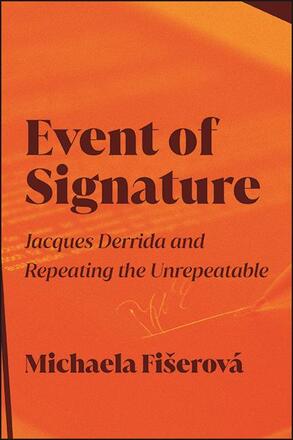
Event of Signature
Jacques Derrida and Repeating the Unrepeatable
Alternative formats available from:
In dialogue with Derrida, formulates a new philosophical problem - a complex aporia that underlines the topic of the handwritten as a sign of legal identification.
Description
Event of Signature formulates a new philosophical problem which focuses on the handwritten signature as sign of legal identification. Author Michaela Fišerová works with three metaphysical expectations, which are shared in discourses of graphology and forensic analysis. The first expectation tends to reveal the signer's soul: a handwritten signature "naturally" mirrors the unique psychological qualities of the signer. The second expectation tends to guarantee the originality of the signer's trace: a handwritten signature proves physical contact between the signed document and the writing tool "authentically" moved by the signer's hand. The third expectation tends to recognize the signer's legal identity: a handwritten signature is expected to reproduce the signer's personal style, which enables identification by legal authorities. In a methodologically inventive and semiotically-based dialogue with Derrida's deconstruction, Fišerová situates this triple expectation in the interval between life and law. Challenging coverage of this topic finally shows that none of the metaphysical expectations will ever be fulfilled in the event of manual signing. Legal uses of handwritten signature are characterized by the complex aporia of repeating the unrepeatable.
Michaela Fišerová is Associate Professor of Philosophy at the Metropolitan University Prague in the Czech Republic.
Reviews
"By bringing Derrida's work on the signature to bear upon jurisprudence and civic identity, Fišerová not only exposes a series of problems underpinning the legality of signing. This overdue undertaking also concretizes the stakes of a key concept in deconstruction. Bank accounts, contracts, petitions—a few of the signatures in Event of the Signature—are no longer expendable examples offered merely to illustrate an otherwise abstract argument. They become the very object of inquiry." — D. J. S. Cross, University at Buffalo, State University of New York
"Fišerová delivers a probing work on legal and civic identity that takes off from our continued investment in the personal idiom of the signature. Despite epochal shifts in technologies of marking, the status of the handwritten signature remains a stable value in forensic analysis and graphology, meshing the signer and signature to juridical effect. A critical detective's delight, Fišerová's account of legal mediation politics breaks down the metaphysical expectations of tracing and identification that nail the fate of the penalized subject and lock in fictions of personhood. The ensuing analysis is incisive and adventurous in the way it reads our historical thumbprint and social capture, handling aporias of resemblance and repetition with breathtaking acuity." — Avital Ronell, the European Graduate School